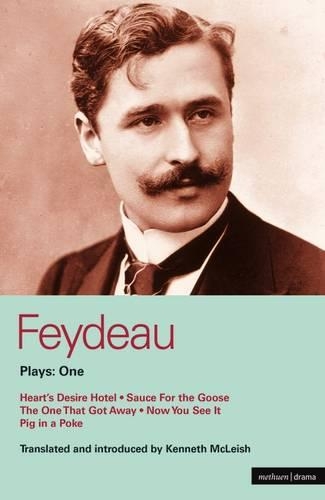
Feydeau Plays: 1: Heart's Desire Hotel; Sauce for the Goose; The One That Got Away; Now You See it; Pig in a Poke
(Paperback)
Available Formats
Publishing Details
Feydeau Plays: 1: Heart's Desire Hotel; Sauce for the Goose; The One That Got Away; Now You See it; Pig in a Poke
By (Author) Georges Feydeau
Bloomsbury Publishing PLC
Methuen Drama
1st August 2006
United Kingdom
Classifications
General
Non Fiction
842.8
Physical Properties
Paperback
544
Width 128mm, Height 198mm, Spine 30mm
574g
Description
Georges Feydeau (1862-1921), now widely regarded as one of the greatest farce-writers, had a succession of dazzling hits in turn-of-the-century Paris that matched high-speed action and dialogue of break-neck speed with ingenious plotting. Reaching the heights of farcical lunacy, his plays nevertheless contain touches of barbed social comment, and allowed him to mention subjects which would have provoked outrage in the hands of a more serious dramatist. In this first volume of his collected works are early successes such as Pig in a Poke (1888) and The One That Got Away (1892), and examples of his more mature masterpieces, including Heart's Desire Hotel and Sauce for the Goose.
Reviews
[A] blissfully funny revival ... nicely renamed in peter Meyer's canny translation to indicate how this is also a story of female revenge against the double standard ... hilarious ... a treat -- Paul Taylor * Independent *
A puckish version by the late Peter Meyer ... this is a farce ... that squares the circle: the action moves like a well-oiled machine while the characters remain thoroughly and hearteningly human -- Ian Shuttleworth * Financial Times *
Plenty of lubricious fun to be had ... the joy ... of Peter Meyer's translation ... lies in seeing recognisable human beings driven to a state of exhausted desperation. -- Michael Billington * Guardian *
Gloriously funny -- Sam Marlowe * The Times *
This gloriously giddy revival of the classic Feydeau farce has real heart ... a dazzlingly complicated plot, that fits together like a spinning Rubik's Cube ... wry asides in Peter Meyer's translation clarify characters' marriages and motivations ... a triumph. -- Laura Silverman * Arts Desk *
Author Bio
George Feydeau (1862-1921) was a French dramatist remembered for his farces, mostly on the traditional themes of adultery, mistaken identity, and misunderstanding. He is widely regarded as a master of plot and dialogue. The best known of his nearly forty plays are perhaps L'Htel du libre change, La Dame de chez Maxim, and Puce l'oreille.
